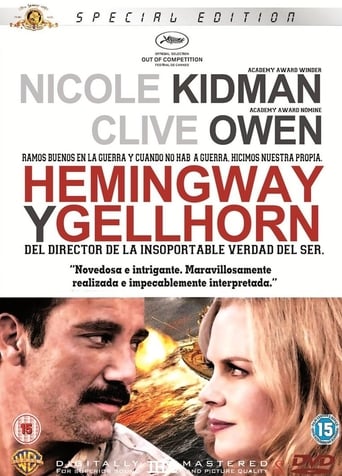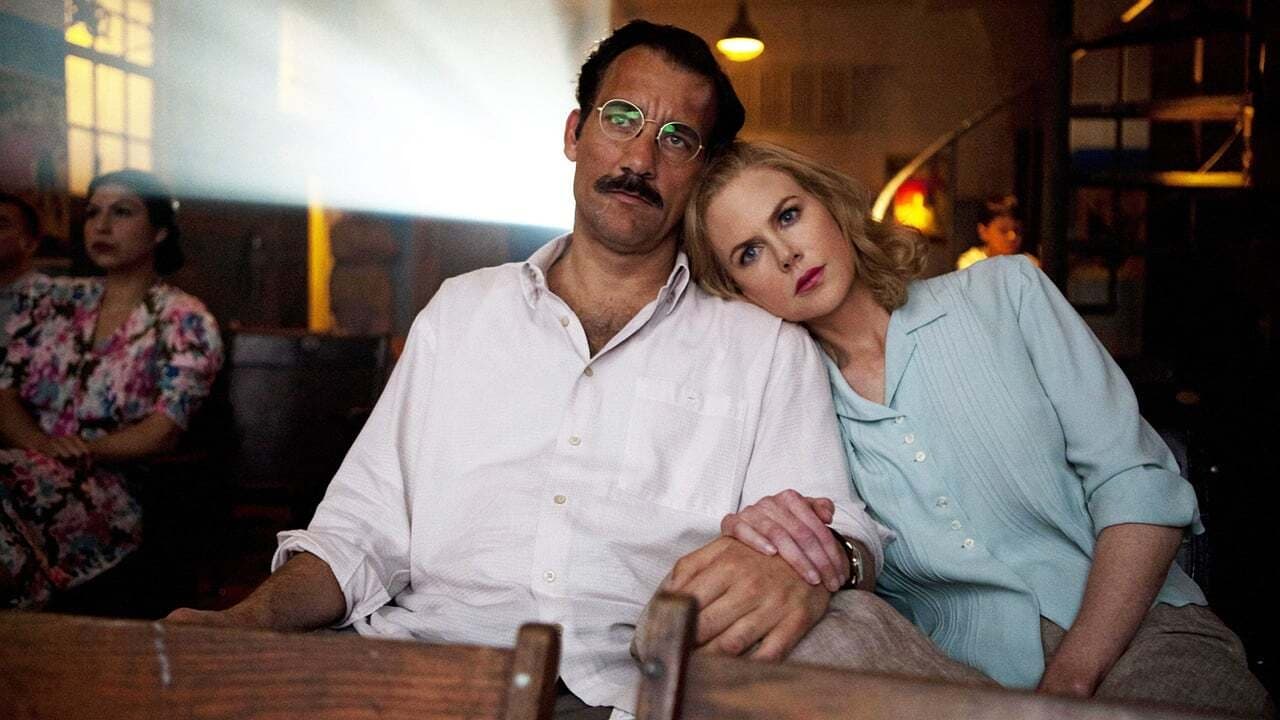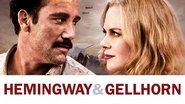rcastl2335
First of all, let me say how incredibly funny--and offbase, the criticisms of this film are. Crankiness about the acting and script, in particular, are hilarious. Except for being about 30 pounds too light for his part, Clive Owen perfectly captured Ernest Hemingway. He was brave, a braggart, a bully, an unabashed adulterer and he did mistreat John Dos Passos during and after the Spanish Civil War. Nicole Kidman as Martha Gellhorn also did a fantastic job as the hardworking, courageous Gellhorn. (BTW: the priss who objected to her sexiness in pants was laughably wrong. Gellhorn did, in fact, catch Hemingway's--and many other men's eye with her long legs and looks.) After having read several Hemingway biographies, I'd say this is a pretty accurate look at the pair, minus a few points for some Hollywoodisms. For example, Mary Hemingway was asleep in another room the morning Hemingway committed suicide. All in all, a terrific film and it's best to ignore the silly carping of the critics, particularly those who MISSPELL HEMINGWAY'S NAME when it's in the title of the film . One "m," people.
nicdar24
I am disappointed that this film was not better. I wanted to like it so much, as it starred two of my favourite actors, had cameos of many well known performers, and had a great story to tell. Unlike other bio-pics, I was not able to be transported to another time to learn about these people. My attention kept being drawn to the poorly written dialogue and odd directing choices (sepia toned segments were gimmicky and distracting). Both Kidman and Owen were miscast in these roles, but Hollywood always has to have its big names, even if they have to shoe- horn them in, and they got a shitty result. I could see Robin Wiegert or Sarah Paulsen killing in this role, if it was better written.
RyanCShowers
It doesn't benefit from being an HBO made for television film, but it does have an indulging romantic moments and enthralling storyline. I wasn't expecting a voice as deep as the one Kidman uses for Gellhorn, but her performance works and you are with Martha's motivations and actions every minute. Clive Owen isn't as successful as Kidman, but he has scenes to seize the audience's attention. Hemingway and Gellhorn mixes the typical style, specifically, the cinematography sparks creativity with different film stocks it utilizes. Not a must see, but a worthy watch.Rating: 7/10Grade: B
weezeralfalfa
My review title illustrates Martha Gellhorn's persistent complaint that her lifetime achievements as a war correspondent and writer merited more historical notoriety than simply being Hemingway's third wife. The title should have Gellhorn's name first, as the film begins and ends with her, without Hemingway. She outlived him by nearly 40 years, and thus had plenty of time to reflect on the significance of their time together. As Gellhorn notes: "A battlefield neither of us could survive was domestic life".(at least, together). They were too much alike in some ways, and yet different in some important ways, for their relationship to last forever. Gellhorn wrote that they were really afraid of each other, each being potentially the most violent person the other knew. Hemingway, being nearly a decade older and much better known by the public when they met, the relationship was bound to deteriorate as Gellman matured from a surrogate daughter and comrade in arms to being a true competitor of Hemingway in terms of taking on dangerous foreign adventures. Nonetheless, at the end of the film, where Gellman makes an imaginary phone call to a long deceased Hemingway, she grudgingly admits some debt to his influence on her life's work in the last line of the film "You're not dead yet, you f---."While the screenplay is mainly limited to the time when Gellhorn and Hemingway interacted with each other, the last portion skips ahead to the last weeks of Hemingway's life, when he's a chronically depressed white -haired old man of 61, undergoing ineffective ghastly electroshock treatments(which I was unaware of), before shooting himself as soon as he got back home. The near catatonic characterization of Hemingway at this time is probably an exaggeration. Just before his suicide, he mouths part of the speech he sent to Stockholm relating to his Nobel Prize, lamenting the typical fate of aging writers. Shortly before this segment, Hemingway is shown choosing to let his fishing line unravel when he hooks a marlin. This implies that he suddenly lost his will to deal with challenging situations and his ability to write effectively: a rather gross exaggeration of the truth. In fact, he continued to write prodigiously, even when seriously ill near the end of his life, and made a '54 trip to Africa. While dramatizing Gellman's activities on and shortly after D-day, the film ignores Hemingway's simultaneous post- D-Day-related activities. Hemingway's severe injuries from several plane accidents and development of several chronic health problems, which much contributed to his depressed state in his last decade, are ignored. The film ends with an unsuccessful attempt by reporters to get an aged Gellman to talk about Hemingway, followed by her imaginary phone conversion with the deceased, then with her exit for yet another foreign adventure.Nicole Kidman was fantastic as Gellhorn: occasionally romantic, but mostly hard-bitten and cynical with age, as a woman who led her chosen life would almost have to be. Gellhorn wrote that she didn't really enjoy sex and, in the film's beginning, says she was undoubtedly a very poor bed partner, that not being where her true passion lay. Hence, all the lovemaking scenes are initiated by Hemingway, often with a resisting Gellman.Clive Owen, as Hemingway, was a much less perfect fit, but still acceptable, for the most part. The details of their relationship and activities during this period apparently were carefully researched, according to the commentary by the director on my DVD copy. Frequent intermittent nesting of the principle actors into archival film footage relating to the various war zones gave an additional perception of authenticity. The frequent switching between B&W, semi-color and full color, which annoys some viewers, helped distinguish the past from the present, and nested archival footage from current scenes. Several lyrics to the tune for "Red River Valley" serves as the running theme song.The scene in which Hemmingway challenges Robert Duvall, as the Russian general, to a modified Russian roulette duel, is interesting. Each grasps the end of the same kerchief in the teeth and circle each other, as each holds a pistol to their head. The point of this bizarre ritual is not apparent before they are convinced to end it and hug each other. Could this represent a foreshadowing of the future Cold War, with nuclear arsenals being represented by the pistols? The initiation and termination of their intense relationship is symbolized by an adversarial conversation through her locked or partially open hotel room door, although their relationship actually began or effectively was terminated prior to these incidents.Their first sexual encounter is a very dramatic scene , as they writhe in ecstasy while the Madrid hotel room they occupy is gradually being destroyed by shock waves from fascist aerial bombs. Hemingway massages plaster dust from the crumbling ceiling over Gellhorn's skin. How many first sexual encounters are this dramatic? Later, as the two are backstage, waiting for Hemingway to be called out to introduce a documentary on the plight of Spanish peasants, he impulsively initiates standup sex with Gellhorn. Perhaps he hoped this would enhance his confidence in his speech, as is thought to have happened with JFK in his first presidential debate with Nixon. Gellhorn then makes a better follow up speech, but is ignored by the press.



 AD
AD




